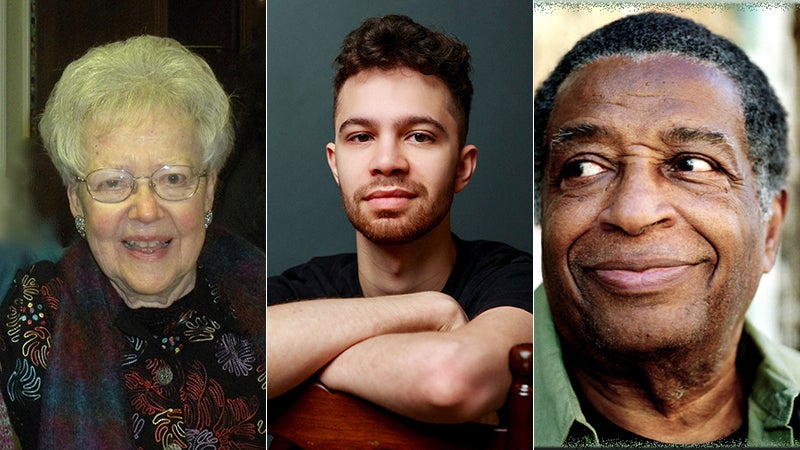Column – Passing the torch: Joseph Vaz pays tribute to his mentor
Published 5:38 pm Tuesday, February 27, 2024

- Gwaltney, Vaz, Bland
By Mary Batten Bland
Few musicians have an opportunity to meet the composers whose works they perform. Pianist Joseph Vaz, who will present a concert in Smithfield March 3, as part of the Sundays at Four series, is one of the lucky ones. Through his grandparents, our dear friends Doris and Atwill Gwaltney, Joseph met my husband, composer Ed Bland.
Barely out of adolescence, Joseph seemed intrigued when he learned that Ed was a composer and former professional jazz musician. The two began talking about Joseph’s budding interest in playing piano. Where that interest would take him nobody could predict.
Each time Joseph and his parents visited his grandparents, we got together and he and Ed had increasingly technical conversations about music and began developing a mentor-mentee relationship.
“He was the first professional musician that I really knew,” Joseph says. “When I was a young musician experimenting with making little computerized compositions and arrangements, he asked me questions about my creative output that no one else would ask. This was more motivating than the encouraging words of many others, I suppose because he showed a genuine and knowledgeable interest.”
Listening to Ed’s music had another impact on young Joseph’s development.
As Joseph says, “His music opened my mind with regard to musical genre. His music plays with so many traditions that it was impossible to pin down and made me think about it a lot, regardless of whether I liked it.” (Ed described his music as a “synthesis of three musical canons: European, West African drumming and African-American.”)
Thanks to computer technology, Joseph sent Ed computerized audio versions of himself playing various pieces of music by different composers. Ed would listen and send back comments and questions. Joseph remembers that Ed also showed him how to use one of the music notation applications so he could compose music himself.
“He showed me how to use the music notation Sibelius, which was my first musical creative tool other than the piano. He once wrote out four bars of a melodic line for me, a melody that started ‘normal’ and quickly warped into a jagged, dissonant thing. I kept that piece of paper for years, and would play out that line on the piano, trying to understand how he came up with that so fast. Most of all, the musical questions he asked me when I was a young boy made me think more deeply about things that I took for granted.”
Ed’s questions were the “most memorable” aspect of their interactions, says Joseph. “He asked me lots of questions: ‘Why did you choose to arrange this piece?’ ‘What made you choose these instruments/this note?’ ‘What do you play on the piano when you’re not looking at music?’ ‘Do you like hip hop?’ As a kid, I was more or less socialized not to like it, so when I said ‘no,’ he looked a little disappointed.”
Year by year, Joseph’s passion for piano grew stronger and his talent shined. By the time Joseph was a high school junior, Ed felt he would be able to play one of his piano compositions. Ed wrote 31 solo piano pieces and none of them are easy. But he felt Joseph’s technique had developed sufficiently to play “Cell Fone Blues” and he sent him a copy. Joseph has now performed that piece many times, including at his last concert in Smithfield. But his most moving performance was a private one. During Ed’s last days on this Earth, Joseph, who had already started learning the piece, rushed to master it so Ed could hear him play it. Ed listened and smiled. “He did a good job,” Ed said.
This coming Sunday, Joseph will perform another of Ed’s piano pieces called “Heat Seeking Missile” from the CD “Urban Counterpoint: The Piano Music of Ed Bland.” It will mark the second time Joseph will have performed it. I will think of it as the Smithfield premiere of the piece.
I was thrilled when Joseph told me that he will write his doctoral thesis on Ed’s piano music. He is currently working toward a D.M.A. (Doctor of Musical Arts) in music performance at City University of New York (CUNY) Graduate Center. “Ed’s piano music is totally unique,” Joseph says. “It takes a long time to get it around my hands, because it’s not traditionally pianistic, it’s very contrapuntal (different musical lines have to do completely different things at the same time), and it’s rhythmically highly complex.”
Mentorship is a way of passing the torch from one generation to the next, and music transcends all boundaries — generational, linguistic, national, ethnic, cultural. In the relay of life, in which we are all runners, each of us carries, receives or passes a torch.
Joseph Vaz carries the torch of music legacy from his grandmother Doris Gwaltney, who taught music before she wrote novels, and his mentor Ed Bland. Through his concerts, Joseph is passing that torch to the listening world.


